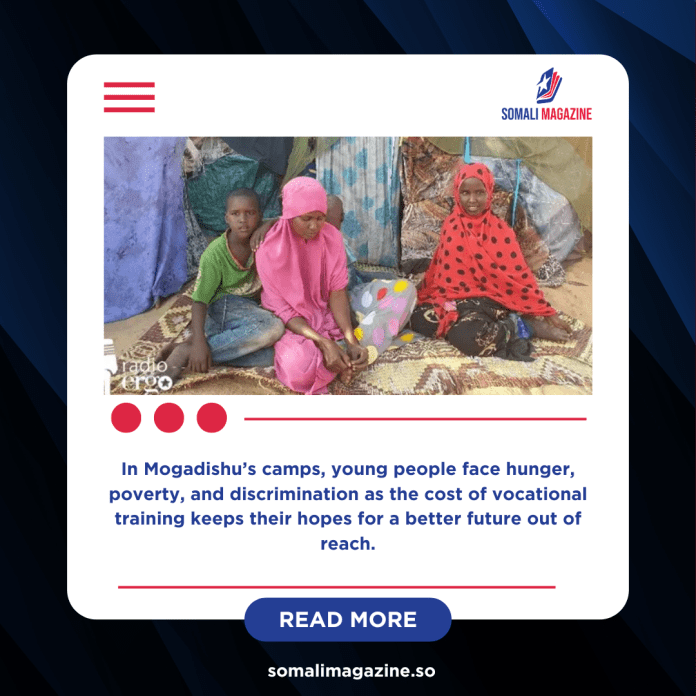Facebook Twitter (X) Instagram Somali Magazine - People's Magazine
Young people living in Mogadishu’s displacement camps say they feel trapped in poverty and unemployment because they cannot afford the cost of training in skills that would give them a chance at a job.
Nineteen-year-old Ahmed Ali Hassan has been desperately searching for work for the past six months, knocking on the doors of six different workplaces, but each time he was turned away. As the eldest child and sole provider for his mother and four younger siblings, Ahmed shoulders the burden of their survival. Even providing one meal a day is a struggle. At night, he listens helplessly as his siblings cry from hunger.
Ahmed once dreamed of becoming an electrician, but that dream ended when he realized he could not pay the $35 fee required by training schools. “My ambition has been destroyed,” he said. His family has been living in Daryel camp in Mogadishu’s Kahda district since 2021, when his mother became too ill with diabetes to continue the cleaning jobs that had sustained them. Since then, Ahmed has been trying to survive by selling small items on the streets, earning less than $2 a night. Out of that, he spends $20 each month on medicine for his mother, leaving little for food or other needs.
Life has been hard since Ahmed was a child. His father died when he was young, and at 15 he began working to support his family. His dream of studying electrical engineering was cut short four years ago when floods from the Shabelle River destroyed their home and farm in Jowhar, forcing them into Mogadishu’s displacement camps.
Ahmed’s story reflects that of many young people in the camps. They want to learn trades like electricity, tailoring, carpentry, phone repair, or computer skills, but the costs are out of reach.
Abdikadir Ibrahim Yusuf, 20, has lived in El-Qalow camp on the outskirts of Mogadishu for five years. Like Ahmed, he carries the responsibility of providing for his family. “My main obstacle is poverty,” he said. “My family depends on me. They couldn’t pay for my schooling before, and now they can’t afford vocational training.”
Water is another daily struggle. His family needs at least 20 litres a day, but the nearest private well charges 3,000 shillings per jerrycan, far more than they can afford. Often, they beg for water and sometimes go without. Abdikadir has long dreamed of becoming a carpenter, but when he tried to register at a carpentry centre, the $25 fee was impossible to pay. He now earns just $1 a day working at a kiosk selling drinks, barely enough to feed his family.
Discrimination adds another barrier. Employers in Mogadishu often refuse to hire displaced people, saying they cannot be trusted. Abdikadir says this has closed doors to jobs he could have done. His family lives in a shack pieced together with cloth and an old tent, constantly fearing thieves who raid the camp at night. Just last month, armed men tried to break into their shelter but fled when neighbours came to help.
Abdikadir’s father was killed in clashes in Qoryoley district in 2020, and their family farm and livestock were lost to drought and conflict, leaving them with nothing.
A recent survey by a local education group, Bar, found that 400 displaced parents in Mogadishu could not afford vocational training for their children. Mahamud Guled Absiye, the group’s deputy chairperson, said that attempts to convince companies to train or hire displaced youth had failed. “Young people in displacement face many challenges,” he explained. “They are often denied jobs because of discrimination. We tried to persuade companies to help, but they refused. Now is the time to support these young people so they can pull their families out of displacement.”
So far, Bar has been able to connect only 40 young people to training centres — a small number compared to the scale of need. While some children under the age of 10 can attend primary schools in the camps, older youth remain excluded, left with no opportunities to continue education or learn trades that could change their lives.

